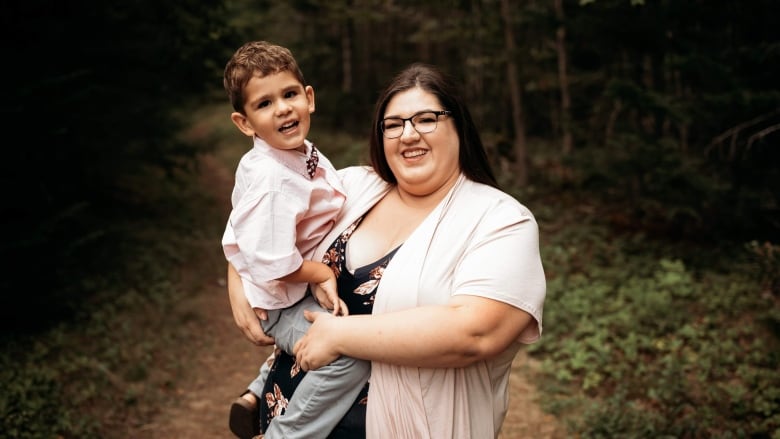When I learned I was pregnant with my son, I started asking myself, “What does it mean to be an Mi’kmaw mother?”

This First Person article is the experience of Alisha Knockwood, a member of the Abegweit First Nation in P.E.I. For more information about CBC’s First Person stories, please see the FAQ.
When I learned I was pregnant with my son, I started asking myself, “What does it mean to be a Mi’kmaw mother?”
It is a hard question to answer when you do not know what it means to be Mi’kmaw, let alone a Mi’kmaw mother. That is when I started to look back on my life living on a reserve.
Growing up I never saw myself as any different from my friends or people I had seen on the street. For a long time, I thought that everyone went to mawiomis/powwows and lived in communities alongside their families.
I am learning alongside my son so that he may see that he can embrace his culture and not be afraid as I once was.— Alisha Knockwood
It was not until I was in elementary school, approximately Grade 4, that I realized that it was not “normal” to live in a community with your grandparents, aunts, uncles, and cousins. People did not get together every summer to drum, sing and dance in regalia.
.jpg?crop=1.777xh:h;*,*&downsize=510px:*%20510w)
Alisha Knockwood said growing up she didn’t really understand what it meant to be Mi’kmaw. When she found out she was pregnant, she decided to change that. 2:25
Understanding what it means to be Mi’kmaw
It took me a long time to understand exactly what it meant to be Indigenous, the good and bad. I remember being called Native, First Nations, Mi’kmaw, Indian and a few other words that were extremely prejudiced and hurtful.
Many of us were taught to keep our heads down so as not to bring attention to ourselves. We were afraid of what people would say or do to us if they knew we were Mi’kmaw.

During my school years it was evident that my cousins and myself were different from everyone else.
Many people would avoid us, making us even more reluctant to embrace our traditions.
During school we learned only a minuscule amount of information about Indigenous Peoples and what a reserve is.
There was never information about how many different nations there are, residential schools, traditional ceremonies, regalia or language.
Fear of teaching traditions
I was never taught our language, or what it meant to practise our traditions.
Ceremonies were never explained to the younger generations as many of the elders in the community had been in residential schools.

Some elders were able to take back many of their traditions and language but feared teaching it to their children or grandchildren.
My grandfathers were in residential schools and did not teach my parents out of fear for being punished or that they would be put into residential schools too.
Taking back my culture and identity
When I became a mom, I realized how much I was missing from my own culture and identity that I needed to take back.
I will never be able to pass on traditions if I do not learn them for myself. It is my responsibility to learn and teach my child about our heritage.

As I have been looking into it more and more, it is very prominent how much was lost. As a Mi’kmaw mother I must take back what was taken from us and teach it to my child so that we do not lose it again.
I am learning my language alongside my son; it brings me so much joy when I hear him speak Mi’kmaw. My son attends daycare within our community where he also learns how to speak Mi’kmaw.
My son will not be afraid as I once was
We may have a long way to go in our learning, but I will never give up asking my elders for help. It was my grandfather Roddy Gould, a survivor of residential school, who taught me how and why we smudge, and how to pray.
He taught me that it was OK to embrace our traditions, and to always ask questions when I did not understand why a certain ceremony or prayer was done.

I have begun to learn about drumming and that each song has a deeper meaning for different occasions or ceremonies. My father has been singing traditional songs to my son since he was a newborn, and he has allowed my son to drum with him on a few occasions for powwows.
I am learning alongside my son so that he may see that he can embrace his culture and not be afraid as I once was. I still have a lot to learn about our heritage, history, ceremonies, regalia and much more, but I am excited to understand and learn about it all.
My journey as a Mi’kmaw mother is just beginning.
If you’re interested in writing a First Person story for CBC P.E.I., you can send us a pitch.
